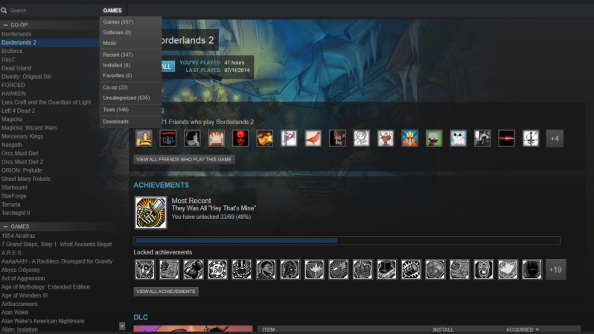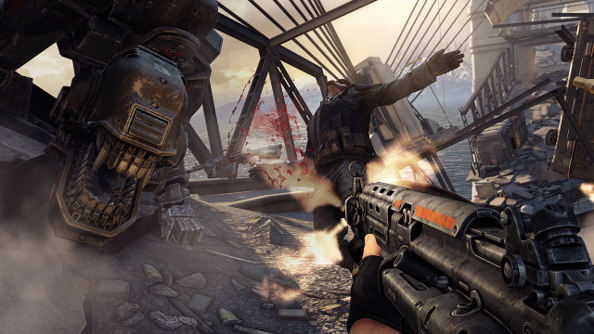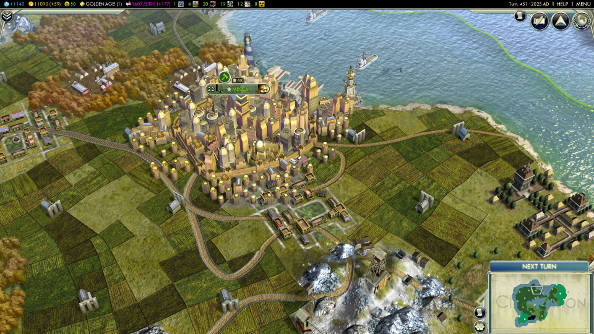It is the most troubling of first world problems, something that keeps us awake at night, sheets clinging to our sweaty skin; it calls to us when we first start up our PCs every day, our pallid, addict faces illuminated by our shame. I am, of course, referring to our Steam backlogs.
They are vast and terrifying, long lists of games that have never been touched. Where have they come from? Steam sales. Humble bundles. Gifts. Impromptu late night purchases based on questionable Steam reviews. They grow and they grow and we’re never going to escape them.
I want to let you know that it’s okay.
I suffer as you do. On my personal Steam account, 30% of my games have gone unplayed. And then there’s the long list of titles I’ve merely glanced at, spending an hour or two on before leaving, promising to come back, but never doing it. For years, it’s been my mission to erode this backlog. I’ve set up systems and schedules to more effectively clear it. But for every game that got taken off the list, two more would be added.

To make you feel a little better about your own backlog, here’s the percentage of games unplayed in the PCGamesN office:
Tim: 90% (Tim would like to point out that he does have over 6,000 games)
Jeremy: 67%
Joel: 50%
Matt: 37%
Phil: 34%
Fraser: 30%
My impotent struggle against my own consumerist urges was not the only issue with my backlog war; there was also the dawning knowledge that playing these games was ceasing to be fun, transforming into a chore. There was no joy in finishing a game, just a moment of relief before I moved onto the next one, exhausted.
I was looking at it the wrong way, setting goals instead of simply enjoying the mountain of entertainment that was right at my fingertips. In my attempt to take chunks out of my backlog, I’d killed off the motivation to keep playing what should have been fun games. See, I looked at my Steam account as wasteful, something to be slightly ashamed off, proof that I didn’t have very much restraint and that I was an easy mark for Valve’s seemingly endless sales.
That is entirely the wrong way to look at a backlog, and the moment I changed my perspective, it ceased to be a chore. Not only that, I started to actually make some headway, but without thinking about it.
Now, my Steam account is a buffet.

It all changed when I realised that there’s nothing wrong with not finishing a game, even if it’s one I rather like. If I fancy shooting some men in the face, as I am occasionally wont to do, then I’ll fire up some Wolfenstein and show some horrible Nazis who’s boss. I’ll play a mission or two, maybe a bit more. And then I might just stop. As long as that itch is scratched, then I don’t feel bad for putting the game down again.
When I do finish a game, then it’s because I’m driven to do so purely out of pleasure, and not some bizarre notion of responsibility or necessity. But most of the time, now, I’m picking up games to fulfill a fleeting desire to have a bit of fun in a specific genre or setting, moving on when something else tickles my fancy.
There’s a big hurdle to overcome before Steam can be treated in this buffet-like manner-like manner, however: that strange sense of shame. We joke about it, but it’s still there. In the PCGamesN office today, as we shared our Steam stats, how much money we’ve spent and wasted, how many games lie fallow in the cloud, there was an undercurrent of embarrassment and attempts made to justify the excess.
Even checking these stats in SteamDB’s Steam Calculator promises to make us feel bad. The button you press to link your profile and spill all those details reads: ‘Get disappointed in your life’, preparing you for the expectation of a gargantuan list of unplayed games and out-of-control sale spending sprees.
We’ve been trained to feel bad about these backlogs, but if they never stop growing, we’ll never defeat them, so why bother?

It’s harder to treat, say, a heavily story-driven game in the way I’m suggesting, as to really appreciate it you’re probably going to want the full experience, but chances are that your Steam library is fat with games that can be dipped into. Open-world games in particular are ripe for this sort of buffet approach.
These are games that you can pour tens, hundreds of hours into, but you’ll inevitably be repeating the same sorts of tasks over and over again. Treated like something you nibble on, however, a brief diversion where you can jump into a big theme park and hunt some enemies, do a spot of crafting, explore some far off landmark just for the sake of it, and it doesn’t have the opportunity to grow stale.
Even more appropriate for a buffet are the games that never truly end. You don’t ‘finish’ Civilization V by winning a game, that’s just one victory; you haven’t completed Crusader Kings II by getting your dynasty to the end date, it’s merely the end of one of an infinite number of potential stories; and conquering the world of late antiquity as the Eastern Roman Empire is not the end of Total War: Attila. You can pick around the edges or dive into them for a week straight — they exist to be appreciated at a pace you set and for however long you want.
None of this is to say that there isn’t value in finishing a game, in staying with it right until the credits roll. It’s just that this doesn’t need to be your goal every time, particularly if that objective starts to become a job. So next time you’re scrolling through that imposing, grey list, just pick something, anything, and see what it’s all about. Did you buy it in a Summer Sale five years ago and promptly forgot about not just the act of purchasing it but even the premise of the game? Brilliant. Take a bite. You might get sucked in or you might just have an entertaining half hour. The worst thing that can happen is that it’s terrible, and you can promptly forget about it again.
